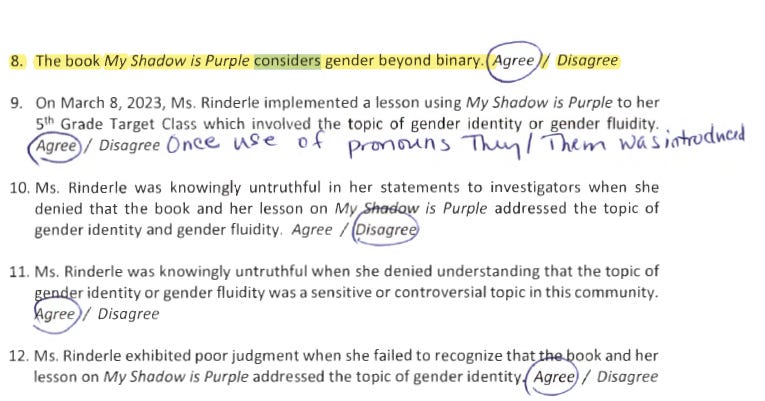Georgia
Teacher fired for reading “considers gender beyond binary” book
A teacher in Cobb County, GA. was fired after a contentious 4-3 vote for reading a children’s book deemed to “consider gender beyond binary”

By Erin Reed | ATLANTA, GA. – In suburban Atlanta on Thursday, the Cobb County School District voted 4-3 to dismiss Katie Rinderle, a fifth-grade teacher, for reading the Scholastic-approved book “My Shadow Is Purple.”
This decision contrasts with a prior ruling by a district tribunal, which cleared Rinderle and recommended against her termination. Georgia and several other states have enacted laws this year restricting youth access to LGBTQ+ materials, including books, art, and other forms of expression.
In Rinderle’s case, her firing was attributed in part to the district’s finding that the book “considers gender beyond binary.”
The book is a Scholastic-approved book recommended for lower primary schools. The book is authored by Scott Stuart, who describes the book as “celebrating authentic identity, whether your true to yourself journey is about gender or just being brave enough to step out of other people’s expectations.” Because of new state laws and local district policies, however, teachers are restricted from teaching “divisive concepts,” which Rinderle has called “intentionally vague.”
Upon discovering Rinderle’s decision to read the book to her class, the school district convened a tribunal. Attorneys representing both the district and Rinderle examined the book closely, concluding that it “considers gender beyond binary,” due to the “use of they/them pronouns.” However, they did not advocate for her dismissal. The ultimate decision regarding her employment rested with the full board, which voted 4-3 along party lines to let Rinderle go.
See this page from the findings of the tribunal:
Teachers have increasingly been targeted over anti-LGBTQ+ laws and their jobs, threatened. Earlier this year, a Florida teacher was fired for indicating that she was LGBTQ+ to her students in response to an open discussion. Another Florida teacher was forced to resign after screening a Disney movie that has a gay character in it. A South Carolina teacher was fired over reading an article that discussed gay people.
This comes on the heels of many states passing laws that allow for the challenging of books in schools and libraries. Eleven states explicitly censor LGBTQ+ topics in the classroom. According to PEN America, a free speech advocacy orgnaization, 1,477 books have been challenged this year over “sensitive material,” often related to sexual orientation or gender identity. Though the majority of these bans happened in just five states (Florida, Missouri, South Carolina, Texas, and Utah), school districts in at least 32 states have banned books.
Exposure of youth to LGBTQ+ themes is increasingly under siege. Earlier this year, lawmakers in West Virginia attempted to pass a law aimed at banning “transgender exposure” to youth, but it did not gain traction. In Montana, there was a push to amend a bill to ban “acts of transgenderism” online for youth, that likewise failed to pass. Florida’s controversial expansion of the “Don’t Say Gay” policy led to a memo that states teachers will be fired if they use pronouns or honorifics different from their birth-assigned sex. These moves collectively amount to an attempt to push LGBTQ+ people out of public life.
Rinderle’s battle appears far from concluded. She retains the option to appeal to the State Board of Education and is said to be “weighing her next steps.” Her dismissal, however, is poised to cast a shadow over educators throughout Georgia, likely discouraging the discussion of LGBTQ+ topics in classrooms. While the Georgia law hasn’t faced legal scrutiny yet, situations like Rinderle’s could certainly pave the way for such challenges. In the interim, teachers grapple with an ambiguous law and the looming possibility of job loss for addressing LGBTQ+ subjects in their lessons.
Related:
***************************************************************************

Erin Reed is a transgender woman (she/her pronouns) and researcher who tracks anti-LGBTQ+ legislation around the world and helps people become better advocates for their queer family, friends, colleagues, and community. Reed also is a social media consultant and public speaker.
Follow her on Twitter (Link)
Website here: https://www.erininthemorning.com/
******************************************************************************************
The preceding article was first published at Erin In The Morning and is republished with permission.
Georgia
A Georgia Pride Executive Director arrested on drug & gun charges
“We believe that all persons are innocent until proven guilty, including Mr. Hobbs. We offer our support to Mr. Hobbs’ family at this time”

COLUMBUS, Ga. – The Columbus Georgia Police Department announced on Wednesday that following a months-long investigation, the Columbus Police Department’s Special Operations Unit executed a search warrant at a residence in the 4200 block of 16th Avenue. Jeremy Hobbs, 49, was taken into custody without incident.
Hobbs, the Executive Director of the Debra Smith Wellness Center Inc., doing business as Colgay Pride, was charged with:
- • Possession of Cocaine with Intent to Distribute
- • Possession of Methamphetamine with Intent to Distribute
- • Possession of VGCSA Schedule I Drug with Intent to Distribute
- • Possession of Drug-Related Objects
- • Possession of a Firearm During the Commission of a Crime
According to Columbus Police, during the search, officers found and seized the following items:
- • 5.4 grams of crack cocaine
- • 20.7 grams of methamphetamine
- • 23.8 grams of liquid GHB
- • An INA .38 revolver
A statement released by Harry Underwood, Vice President of Communications, Colgay Pride and the board of the Debra Smith Wellness Center, Inc. in response to Hobbs’ arrest noted:
“The board of the Debra Smith Wellness Center, Inc., doing business as Colgay Pride, expresses our utmost concern and regret regarding the arrest and charges facing our Executive Director, Jeremy Hobbs. The charges which have been filed against him are serious. The board does not condone the alleged actions and we will cooperate with law enforcement in the coming investigations regarding our operations and finances.
We believe that all persons are innocent until proven guilty, including Mr. Hobbs. We offer our support to Mr. Hobbs’ family at this time.
Our organization will meet to discuss our next steps, including a transition in leadership and strategy in the interim period. Our events and operations are on hold until further notice. With humility, we ask for the understanding and solidarity of the local community in this period. We apologize to our allies, colleagues and partners for the distress caused by these developments.”
Georgia
Georgia Southern University students protest after LBGTQ+ cuts
The protest “differed in tone and tenor from the pro-Palestinian demonstrations happening at campuses across the country”

STATESBORO, Ga. – Several hundred students and supporters gathered in the central atrium of the Russell Union student center at Georgia Southern University (GSU) on Monday protesting the suspension of an LGBTQ+ inclusion training program, Safe Space, to the relocation of health care resource listings from a GSU public website.
The Atlanta Journal-Constitution reported Ellen Murphy, a grad student, organized the demonstration along with a handful of others, including members of Georgia Southern’s LGBTQ student organization, the Gay-Straight Alliance.
Murphy and other protestors, who were joined in solidarity by a handful of university administrators aimed to send a message to university administration after they suspended the LGBTQ+ initiatives, removing “information about services, including therapy groups for LGBTQ+ students, training to educate faculty/staff about LGBTQ+ identities (ie, Safe Space/Zone), medical treatments for transgender students, career resources, LGBTQ+ symbolism, and diversity statements from the university website.”
Georgia Southern administrator Dominique A. Quarles told the Atlanta Journal-Constitution the Safe Space training was paused because a compliance review of University System of Georgia human resources administrative practices found the program violated recent policy revisions.
The university is exploring alternative approaches to restore Safe Space or to offer similar training that doesn’t violate University System policy, Quarles told the AJC. The timeline for the reboot is the fall semester, which begins Aug. 14.
In a letter to GSU, Murphy and other protestors claimed that “pride flags were promptly removed from the shelves of the university bookstore, and adjustments were made to programming for upcoming events for LGBTQ+ students.” This included students being given notice that “drag events would no longer be permitted on campus.”
The letter also highlighted that GSU President Kyle Marrero had ordered the removal of a poster promoting gender-affirming care in the school’s counseling center.
The Atlanta Journal-Constitution pointed out that the protest “differed in tone and tenor from the pro-Palestinian demonstrations happening at campuses across the country.” Organizers took steps during the planning process to ensure participants would “act in alignment with our values.”
Related:
Georgia
Georgia state legislature adjourned, anti-trans bills don’t pass
Bill banning puberty blockers for minors languishes alongside other culture war measures in the waning hours of the session
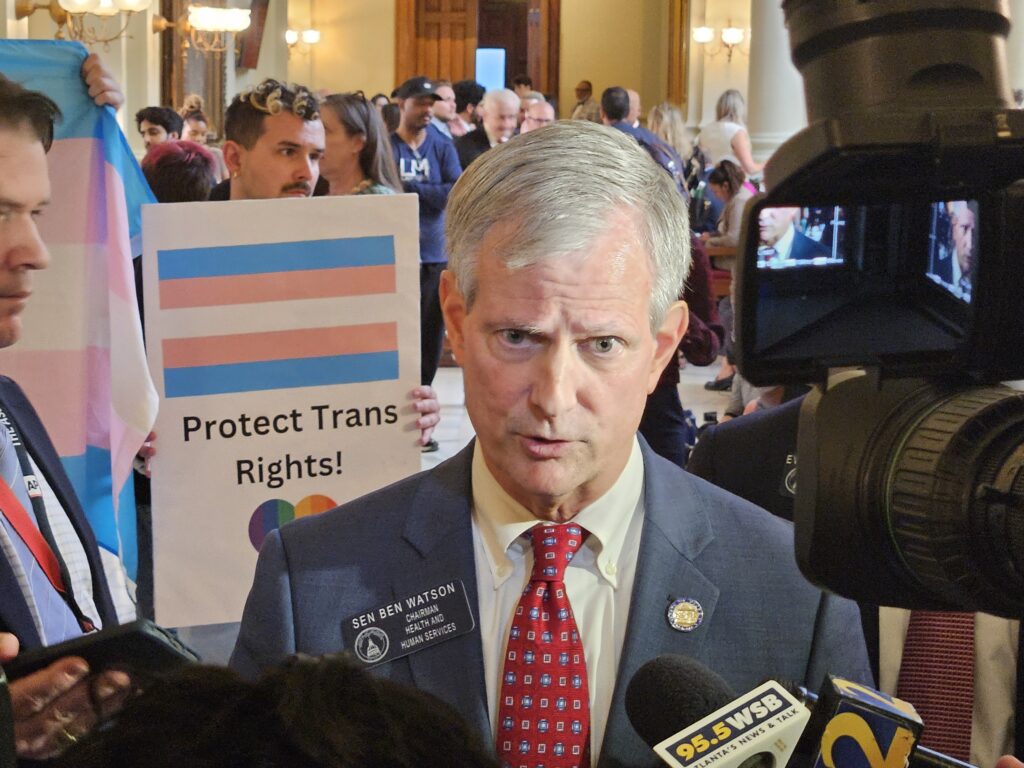
By Ross Williams | ATLANTA, Ga. – Two bills watched with dread by transgender Georgians and their allies withered away in the wee hours Friday morning after the House took no action on them on the final day of the 2024 Legislative session.
Every year under the Gold Dome brings new battles in the culture wars and bills often based more upon ideology than practicality, nestled firmly within the crusty crannies of the cultural divide.
This year, as in previous years, questions of ethical appropriateness centered largely on transgender children, but unlike in recent years, the trans kids made it through Sine Die without new restrictions – despite two bills out of the Senate that would have banned transgender children from playing on sports teams or using restrooms corresponding with their gender identities and blocked them from accessing puberty blocking drugs.
Both passed the Senate on party lines, but neither got a House vote Thursday.
“We know there’s some things, we know there’s some issues, social issues, if you will, that are important to Georgians,” said Republican House Speaker Jon Burns to reporters after the House adjourned. “And there’s some of them that we embrace, but they’re also – we know there’s a time. And timing was maybe not right today for some of those issues that came over from the Senate.”
“We’ll continue to work with the Senate and look at those issues and make some determinations on what’s good for all Georgians in every walk of life,” he added. “And so we’re conscious of those issues. They’re priorities – many of them are, but they’re maybe not the same ones as the Senate.”
Cole Muzio, president of the conservative Frontline Policy lobbying group, called the bills’ failure to pass “a missed opportunity.”
“Both of those issues are broadly supported by a lot of Georgians,” he said. “And I think as people prepare to go to the polls in November, as they’re looking for what they expect out of this building, that’s the kind of bold action they are looking for. Obviously, a lot of good things happened in this building this year. Georgia needs to turn in the right direction, but we’ve a lot to do heading into 2025, and so we’re excited to add those onto our agenda then and we’ll be back tomorrow.”
House Democrats expressed relief when the chamber adjourned close to 1 a.m. without taking up the controversial measures.
“I’m happy that we did not pass legislation that would have caused a lot of real harm for a very vulnerable population, transgender youth,” said Lawrenceville Rep. Sam Park, Democratic Caucus whip and the first openly gay man elected to the General Assembly. “It’s a reminder that despite the polarized political environment that we’re in, that we can still come together and move Georgia forward by, again, not passing a very dangerous and harmful piece of legislation. It’s been a tough legislative session, but yeah, I think we ended just fine.”
Puberty Blockers
Under the pen of Senate Education and Youth Committee Chair Clint Dixon, House Bill 1170, which originally put opioid reversal drugs into government buildings, instead became an effort to ban puberty-blocking drugs for transgender minors.
These drugs, originally used by children who enter puberty too early, have been used in recent years by kids with gender dysphoria to put off going through a puberty that doesn’t match their views of themselves. Last year, the state banned hormone therapy, or prescribing testosterone or estrogen, to minors, but allowed puberty blockers to remain as what GOP lawmakers called a compromise.
Sen. Ben Watson, a Savannah physician who sponsored the bill in the Senate, said also forbidding doctors from prescribing drugs to prevent children from going through puberty will make parents’ jobs easier.
“Last year and this year, many parents have come to me privately wishing that this law was in effect in the past,” he said. “And I find that affirming, I find that sometimes challenging, from that perspective, it is difficult, no doubt, being a parent, and sometimes saying no is difficult, but saying no, many times, with the law behind you makes it easier.”
Watson said the effects of puberty blockers can be permanent and he hoped to prevent minors from making life-altering decisions.
“Surgery is irreversible. Sex change hormones are irreversible, and puberty blockers can also be irreversible,” he said. “With the fact that if you’re not on puberty blockers, half of the children do not go on to proceed changing their sex, I think that’s very important. With the puberty blockers, virtually 100% go ahead and do sex change hormones. I think we need to give the children continued mental health counseling, continued care, continued love.”
Many transgender people say going through what they often call the wrong puberty was a difficult time.
“It can really make a big difference. I started before I turned 18, and that was before SB 140, and that was a big hot button issue for some people, but I can’t tell you how happy that made me,” said Lucas Tucker, a transgender man from Decatur who came to the Capitol to speak against anti-trans bills in committee hearings. “If I wasn’t on them now, I would not be the person I am. It really makes a huge difference.”
“Giving trans children access to their bathrooms and their hormone therapy and things like that will save them,” he added. “Because people make fun of us. They say, oh, 40% or whatever of trans people kill themselves. You know why? It’s because of you. It’s because you make it possible for us to do that. You enforce legislation that shoves us back in the closet. And for a lot of people, being in the closet is the same as being dead because you can’t live in the closet.”
Christmas tree bill
Senators placed provisions banning transgender students from playing on sports teams or using restrooms conforming with their gender identity as well as a ban on sex education before 6th grade and provisions allowing parents to more easily monitor the books their children check out from school libraries into House Bill 1104. That measure was originally a bill from Decatur Democratic Rep. Omari Crawford that was intended to address mental health and suicide risks for student athletes.
Such bills are sometimes called Christmas tree bills because they are adorned with amendments like a Christmas tree is covered in decorations.
As he left the chamber early Friday morning, Crawford said he hopes to come back next year and push for his original bill, which he says will protect student athletes’ mental health.
“I’m glad that the bill and the Senate substitute did not pass,” he said. “There was a lot of language that I didn’t agree with, and so what we’ll try to do next year is make sure that language that was the intention of the bill is reintroduced, hopefully we can pass that.”
***************************************************************************************

Before joining the Georgia Recorder, Ross Williams covered local and state government for the Marietta Daily Journal. His work earned recognition from the Georgia Associated Press Media Editors and the Georgia Press Association, including beat reporting, business writing and non-deadline reporting.
***************************************************************************************
The preceding article was previously published by the Georgia Recorder and is republished with permission.
The Georgia Recorder is an independent, nonprofit news organization focused on connecting public policies to the stories of the people and communities affected by them. We bring a fresh perspective to coverage of the state’s biggest issues from our perch near the Capitol in downtown Atlanta. We view news as a vital community service and believe that government accountability and transparency are valued by all Georgians.
We’re part of States Newsroom, the nation’s largest state-focused nonprofit news organization.
Georgia
Anti-trans omnibus bill passes Georgia Senate, skirts deadlines
An anti-trans “omnibus” bill, dubbed a “Frankenbill” by detractors, has passed in Georgia, with another one pending

By Erin Reed | ATLANTA, Ga. – Today, Georgia’s Senate passed House Bill 1104, an “omnibus” bill designed to consolidate several anti-transgender policies into a single piece of legislation.
Additionally, the Senate will debate House Bill 1170 later this evening, which proposes adding puberty blockers to a ban on gender-affirming care already passed by the state. Both bills were attached to entirely unrelated legislation as a strategy to circumvent rules that mandate bills pass at least one chamber by a specific deadline, effectively rendering that deadline meaningless for anti-trans legislation.
This weekend, it was announced that both bills would appear on the Senate calendar, and at 4 PM on Tuesday, House Bill 1104 passed on a party-line 33-21 vote. The Georgia Legislature is set to adjourn sine die on Thursday.
This year, more than 14 anti-trans and anti-LGBTQ+ bills were introduced in Georgia. Some of these proposed measures would have forcibly outed transgender youth in the state. Others would ban transgender students from using the bathroom that aligns with their gender identity. The hearings for these bills were met with significant opposition and led to tense encounters. In one notable hearing, only supporters of a bill were permitted to testify, despite a room full of opponents.
Another moment that garnered attention involved a Republican senator in Georgia who approached a girl to vow to protect her with a bathroom ban, only to run away upon discovering she was transgender. The bills did not advance past their respective chambers before “crossover day,” the deadline by which a bill must be passed by at least one chamber or be considered dead.
However, now, the language from those failed bills were added onto entirely unrelated bills in a bid to get around those rules. House Bill 1104 originally was a bill about showing mental health videos to high school athletes in the state. After being amended, that bill would now:
- Ban transgender students from sports of their gender identity.
- Ban transgender students from bathrooms of their gender identity, though the scope and enforcement is unclear.
- Allow parents to be notified of every book a student checks out.
- Bar sex education before 6th grade and make all sex-ed entirely opt-in.
- Expands obscenity laws in schools which have been used to ban books.
Similarly, House bill 1170 was a bill originally about opioid overdose protections. That bill has been amended to now bar puberty blockers for transgender youth. Georgia had previously banned gender affirming care for transgender youth, but that ban did not originally include puberty blockers.
The reaction to the attempt to skirt the rules was swift. Isabelle Philip from the Georgia Youth Justice Coalition stated, “Yesterday, HB 1104, a bill to support the mental health of athletes was overwritten to ban trans youth from playing on their school’s sports team and from using the correct bathroom, endangering some of our most vulnerable young Georgians, alongside a slew of other anti-LGBTQ+ restrictions. No substantial notice was given for public comment, which was stacked with far-right extremists, a tactic to exclude us from deliberation that directly impacts us.”
Georgia Equality stated, “Extremists in the State Senate are trying to pass unpopular legislation through anti-democratic means… the majority of Georgians oppose discriminatory anti-LGBTQ policies, & tactics like these are a shameful attempt to silence that majority.”
Then, on Tuesday, House Bill 1104 came up for debate. Democrats delivered scathing criticism, while no Republican stood to speak in favor of the bill except for the bill’s sponsor. Democratic Senator Elena Parent rebuked Republicans for requiring sex education classes to have extensive notices filed before they would be allowed to occur, pointing out that the legislature itself rushed the bill through while skirting public notice and state-required deadlines:
“It is not particularly material to the policy, but it is extraordinarily galling nonetheless and indicative of the hubris that exists within this building, that this legislation requires two public hearings to be put on by the school board… they then have to publicly notice it at least two weeks before they adopt a sex ed curriculum… then they on lines 135-138 have to have the curricula be available and accessible for public comment for at least 45 days before approval of any sex education curricula. Well… this bill popped up in committee with no notice, no 45 days, no opportunity for review, no opportunity for public input, and it wasn’t even online by the time we were voting on it. It is outrageous that we are busy mandating these things for school boards across the state while behaving in the complete opposite way.”
Senator Josh McLaurin called the provisions weak and called out Republican claims of anti-trans poll numbers, stating, “what polls even worse than a perceived lack of fairness in these polls is being a bully.” Polls repeatedly show that most people support equality protections, would be motivated to vote against legislators who make anti-trans politics a major part of their platform, and consistently rank trans issues as one of the lowest priority issues they care about.
Despite no Republican speaking in favor of the bill, HB1104 passed on a party-line 33-21 vote:
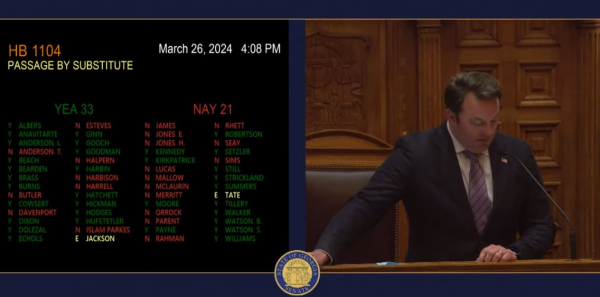
Georgia may be set to diverge from the trend observed in other states this year, where there has been a retreat from anti-trans legislation. For example, several bills were defeated in Florida targeting LGBTQ+ people, including several specifically targeting transgender individuals.
In West Virginia, dozens of proposed anti-LGBTQ+ bills met a similar fate. At the national level, during budget negotiations, Democrats were able to eliminate 50 anti-trans provisions. Other Southern states, including Louisiana, Mississippi, and Alabama, appear to be advancing severe anti-trans legislation.
House Bill 1170 is still slated for a vote in the Senate. Should it pass, both it and HB1104 will go to the House for final concurrence, whereupon they will need the Governor’s signature for final passage into law.
****************************************************************************

Erin Reed is a transgender woman (she/her pronouns) and researcher who tracks anti-LGBTQ+ legislation around the world and helps people become better advocates for their queer family, friends, colleagues, and community. Reed also is a social media consultant and public speaker.
******************************************************************************************
The preceding article was first published at Erin In The Morning and is republished with permission.
Georgia
Georgia GOP senators hijack bill, go after trans kids & sex ed
A bill aimed at protecting the mental health of student athletes became a bill attacking transgender students

By Ross Williams | ATLANTA, Ga. – A bill aimed at protecting the mental health of student athletes became a bill banning transgender students from bathrooms, requiring schools to notify parents every time their child checks out a book from the school library, stopping transgender kids from participating in girls sports and banning sex education before sixth grade in a Senate committee Tuesday.
As the number of days left in the 2024 Legislative session decreases to a few days, lawmakers are tempted to graft legislation that has not yet passed one of the two chambers onto bills that have, giving their seemingly dead bills a new chance to reach the governor’s desk.
“Each provision of this bill is strongly supported by Lt. Gov. Burt Jones, and I’m thankful for the opportunity to propose this legislation and these several pieces of the different bills, many of which we have heard in this committee and passed out of committee this session,” said Senate Education and Youth Committee Chair Clint Dixon. “While this bill has several parts, I think they each have a common thread of empowering parents to ensure that children are learning and competing in safe and supportive atmospheres, also dealing with sports.”
But LGBTQ+ advocates called the bill and the legislative maneuvering contemptible. State senators earlier this month added language banning puberty-blocking drugs from being prescribed to transgender minors to a bill expanding the availability of overdose prevention drugs.
“This is disgraceful politics: hijacking one bill designed to address student-athlete mental health concerns and another designed to fight the opioid crisis, and replacing them with attacks on Georgia’s LGBTQ+ youth,” said Human Rights Campaign Georgia Director Bentley Hudgins.
“The original bills garnered overwhelming support in the House and held the promise of improving the lives of individuals in crisis. Instead, they have been transformed into legislation that jeopardizes the well-being of our LGBTQ+ youth. Georgia’s lawmakers should focus on passing solutions that address real problems that our citizens face.”
Decatur Democratic Rep. Omari Crawford, the original sponsor of the mental health bill, did not appear happy with the changes. He requested the committee not hold a vote and said he wants the language from his bill moved to a different one. The text of his bill remains partially intact within the new one, with references to private schools stripped out.
Democrats on the committee expressed outrage with the process.
“I wanted to just first acknowledge that Rep. Crawford’s bill is now filled with a bunch of bills that have, as they’ve been vetted through this committee, been some of the more contentious conversations that we’ve had over the course of this biennium,” said Atlanta Democratic Sen. Sonya Halpern.
“And so I feel sorry for the gentleman, Rep. Crawford, who’s now, for his first bill, got it filled with stuff that’s not going to be easy for everybody to get behind as his bill was when it came through the House,” she added.
Sex Ed
Atlanta Democratic Sen. Elena Parent had questions about the sex education portion of the bill, which was originally authored by Dixon as Senate Bill 532. The bill does not allow for lessons about reproduction before sixth grade, but does allow discussion of menstruation.
“How are the schools supposed to talk about menstruation without talking about human reproduction, which is forbidden before sixth grade?” Parent asked.
“I am not a woman, but I did stay at a Holiday Inn Express once,” Dixon said with a laugh. “But I would say to the reproductive organ part of it or whatnot, I don’t think that would align with sex education.”
“So you think you can talk to a girl about menstruation without touching on any aspect of human reproduction? Because that’s what the bill – How? Please let us know.”
“That’s a great question,” Dixon said. “I’ve got two daughters. One is currently going through puberty, and my wife and I have been able to successfully, with her guidance and her leadership, my wife’s leadership, have had those conversations with her without talking about reproduction.”
“So you talked about – you don’t give any explanation for why the menstruation is happening?” Parent asked. “Because if you give an explanation for why it’s happening, that involves human reproduction, and I can stop going down this line, I’ll just posit to you that I think that that is a practical impossibility that is contained in the bill.”
“It was a great question, I appreciate you bringing that forward,” Dixon said. “My wife may have handled that part of it with my daughter as I handled that part with my son, but I think that’s appropriate for parents to do that.”
School Libraries
Another aspect of the bill is a push by Cumming Republican Sen. Greg Dolezal to require libraries to notify parents of what materials their children are checking out.
Under the language of what was originally Senate Bill 365, local boards of education would have to devise policies to allow parents to opt into being automatically notified each time their child checks out a book from the library.
Another Dolezal library bill which would remove an exemption for school librarians to the state’s law concerning distributing harmful materials to minors is presumed dead after failing to cross over by the legislative deadline.
A bill by Perry Republican Sen. Larry Walker pulling Georgia out of the American Library Association, a group conservatives say has become too woke, is still alive. It was debated by the House Higher Education Committee Monday but did not receive a vote.
Transgender Bans
Another new portion of the bill is based on Senate Bill 438 by Cordele Republican Sen. Carden Summers and reaffirms Georgia’s ban on transgender students participating in school sports.
“This bill requires public schools and private schools that participate in sport leagues with public schools to not permit boys to compete in sports that are designated for girls, no matter the gender identity that one may claim at that time for sporting events,” Dixon said. “It also prohibits schools from allowing boys to use multiple occupant restrooms for changing areas designated for girls.”
Dixon sought to cast the bill as pro-woman.
“I’d just like to go back to, you know, females, which I’m not one, y’all have been fighting for your rights for equal places in all aspects of our lives, and here we are, carving or digging away at this, allowing biological males to beat in female sports, and it’s a common sense thing to protect females here, in the restroom and in sports,” he said.
The men on the committee, all Republicans, agreed, voting unanimously in favor of the bill, but the three women on the committee, all Democrats, voted no.
If the bill is to become law, it must pass the Senate and the House before the end of the session, March 28.
***************************************************************************************

Before joining the Georgia Recorder, Ross Williams covered local and state government for the Marietta Daily Journal. His work earned recognition from the Georgia Associated Press Media Editors and the Georgia Press Association, including beat reporting, business writing and non-deadline reporting.
***************************************************************************************
The preceding article was previously published by the Georgia Recorder and is republished with permission.
The Georgia Recorder is an independent, nonprofit news organization focused on connecting public policies to the stories of the people and communities affected by them. We bring a fresh perspective to coverage of the state’s biggest issues from our perch near the Capitol in downtown Atlanta. We view news as a vital community service and believe that government accountability and transparency are valued by all Georgians.
We’re part of States Newsroom, the nation’s largest state-focused nonprofit news organization.
Georgia
Lawmaker vows to protect girl until he learns she’s trans & bolts
Senator Carden Summers (R) knelt down and told a child he would protect her. When he learned she was trans, he backed away
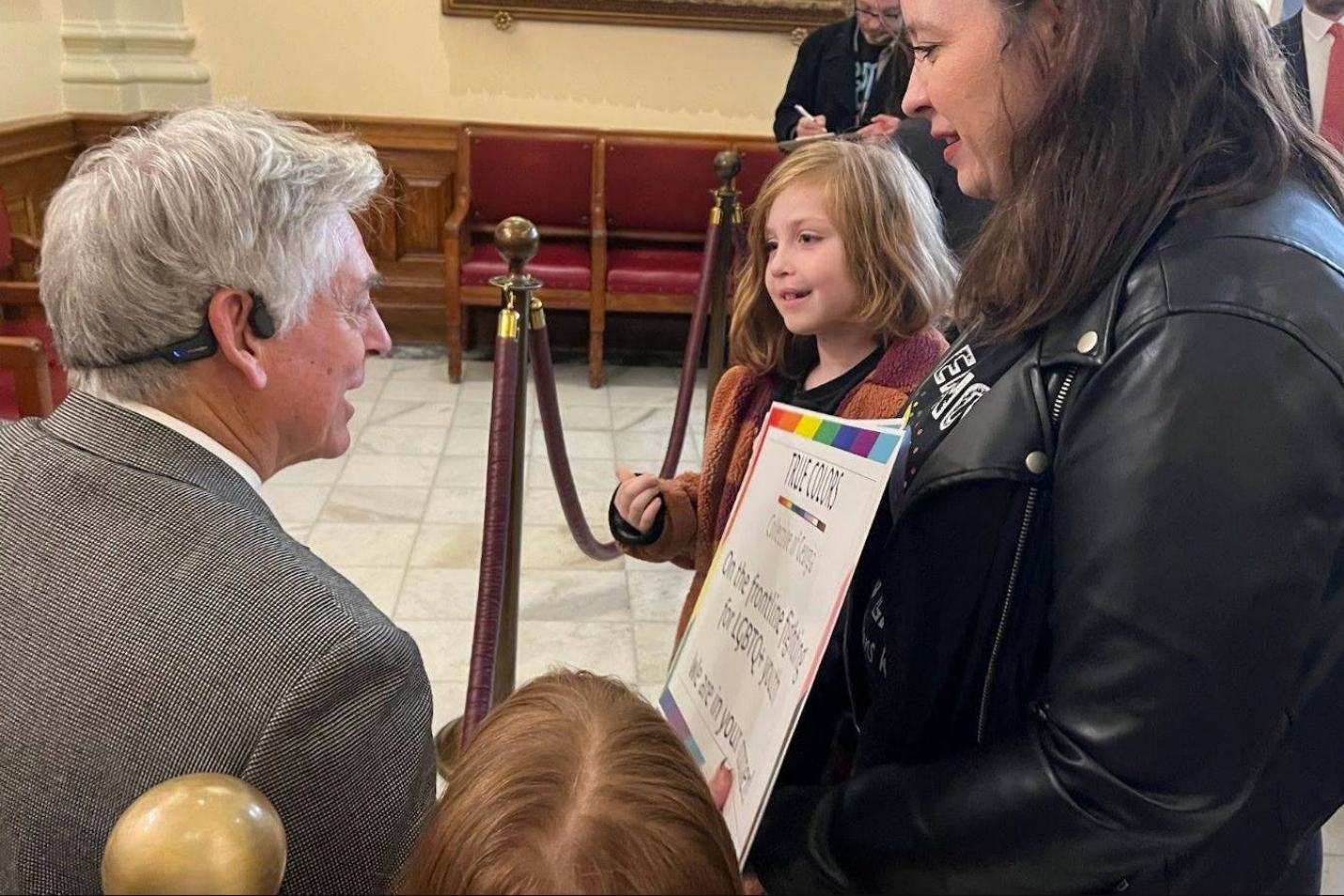
By Erin Reed | ATLANTA, Ga. – On Feb. 6, a group of families met to lobby senators on issues affecting the local transgender community in Georgia. One mother, Lena Kotler, decided to take her two children with her to give the topic a human face.
While waiting to meet with Democratic state Sen. Kim Jackson, who they had heard was a big supporter of LGBTQ+ rights, another senator passed by — Republican state Sen. Carden Summers, the primary sponsor of the state’s bathroom ban bill. Little did he know that one of the children he would be interacting with, Aleix, 8 years old, was a transgender child.
According to Kotler and other families who were present, the senator stopped to say hello. That’s when Kotler spoke to Senator Summers about how she was there with her kids to “talk to legislators about keeping her kids safe.”
Although she did not mention that one of her children was trans, they were present with LGBTQ+ signage – something the Senator apparently missed when he knelt down in front of Aleix and said, according to Kotler, “Well you know, we’re working on that and I’m going to protect kids like you.”
Kotler then replied, “Yeah – Aleix is trans, and she wants to be safe at school, she wants to go to the bathroom and be safe.”
That is when, according to multiple witnesses, Sen. Summers stood up and fumbled his words, repeating, “I mean, yeah, I’m going to make sure she’s safe by going to the right bathroom,” continuing to use the correct pronouns for Aleix. When asked if he would make her go to a boy’s bathroom, he then allegedly backed away, saying, “You’re attacking me,” turned around, and walked off quickly.
The exchange was a unique encapsulation of why anti-trans bills that ban transgender people from public spaces that match their gender identity have proven ineffectual in the past. In numerous hearings over bathroom bans, transgender people often point out that cisgender individuals cannot always tell who is and is not trans.
Enforcement of anti-trans policies like Sen. Summer’s bill, which would ban transgender youth from bathrooms of their gender identity, will inevitably catch cisgender people who are gender nonconforming in the same net. Worse, it would force transgender kids into the wrong bathroom — kids who even the senator who wrote the bill innately realized he needed to protect from bathroom harassment before learning the child was trans.
Sen. Summer’s bill, Senate Bill 438, is just one of several bills targeting transgender people this year in Georgia. Another bill, Senate Bill 88, which would enact policies to out transgender youth to their parents, was recently passed through committee while senators only allowed people who supported the bill to speak. Other bills include one that would ban drag, a book ban, and a bill that would end all legal recognition of transgender people in the state.
Kotler did eventually meet with Sen. Kim Jackson and Sen. Jason Esteves, whom she says are stalwart supporters of LGBTQ+ rights in the state. There, she said, she shook their hands and told stories of what her child was experiencing with her local school district. When asked why the conversation was important, she stated, “The senators are fighting an uphill battle, but my kids at least got to be told that they matter, and that they should be able to live their identities openly and safely.”
It is unknown if their presence made an impact on Sen. Summers or other senators they spoke to. However, Sen. Summers’ bill, SB 438, has yet to be scheduled for a hearing.
As for Kotler, she says she’s not planning on going anywhere, and her kids agree. According to Aleix, who Kotler says comes from a long line of people willing to fight for what they believe in, “leaving lets them win.”
****************************************************************************

Erin Reed is a transgender woman (she/her pronouns) and researcher who tracks anti-LGBTQ+ legislation around the world and helps people become better advocates for their queer family, friends, colleagues, and community. Reed also is a social media consultant and public speaker.
Follow her on Twitter (Link)
******************************************************************************************
The preceding article was first published at Erin In The Morning and is republished with permission.
Georgia
Gays Against Groomers allowed speak as the opposition is silenced
What happened in the hearing was unusual: only those in favor of the bill were allowed to speak, leaving those against raising their hands
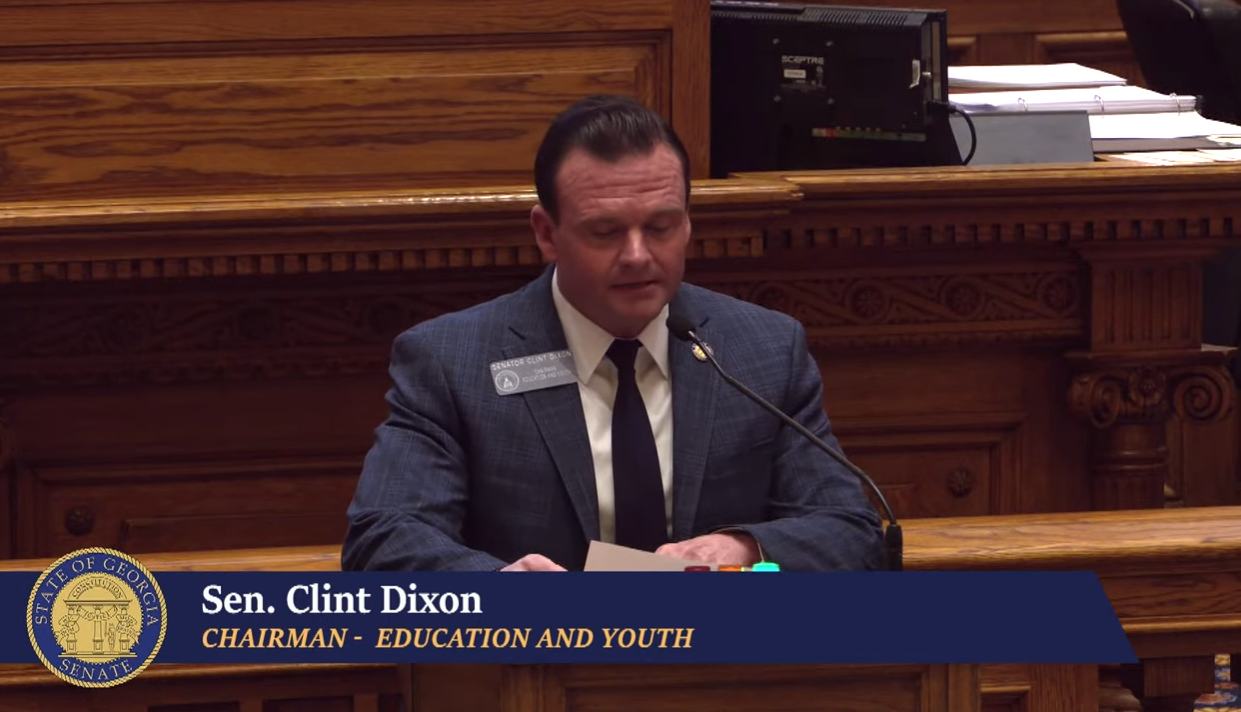
By Erin Reed | ATLANTA, Ga. – On Tuesday, the Georgia Senate Committee on Education and Youth met to consider Senate Bill 88, a bill that would promote the forced outing of transgender youth to their parents and restrict LGBTQ+ topics in schools.
The bill, which saw a surprise substitute with little time for review, would mandate that schools develop policies around outing transgender students to their parents and would require parents to opt into education on gender-related topics.
In a hearing in Georgia on Senate Bill 88, a bill that restricts LGBTQ+ curriculum in schools, Republicans only allowed people from Gays Against Groomers and Log Cabin Republicans to speak.
What happened in the hearing, however, was unusual: only those in favor of the bill were allowed to speak, leaving those against raising their hands.
Immediately after the bill’s sponsor spoke about the bill, he ceded the floor to Jeff Cleghorn, a gay anti-trans activist who calls transgender people “mentally ill sex fetishists” and regularly shares content from groups like Gays Against Groomers and Libs of TikTok. Following an incendiary speech in which he advocated for separating transgender individuals from the LGBTQ+ community, Republicans allowed four people to speak. These included a former president of the Young Republicans, a representative from Gays Against Groomers, and a representative from the Georgia Log Cabin Republicans, a group of gay Republican activists. They then abruptly ended the debate, preventing the dozens of attendees opposed to the bill from speaking.
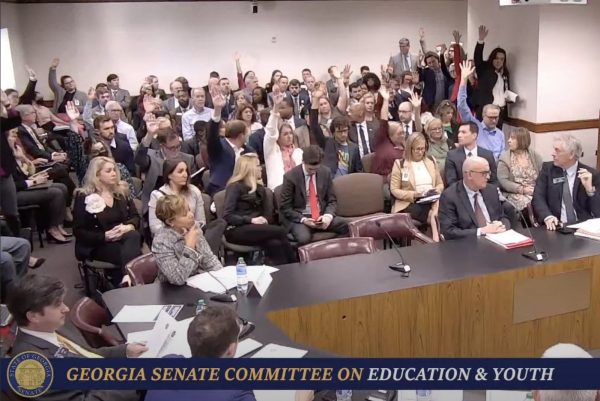
Noting the refusal to hear those who were there to speak against the bill, Senator Donzella James posed a general question to the crowd, asking how many had come to testify against the bill. Hands shot up across the room. Moreover, many of those who did not raise their hands were present because of bills being heard later in the same committee. You can watch the exchange here:
Republican senators seemed unconcerned with their testimony, however, and proceeded forward to vote. Prior to the vote, Senator Elana Parent raised the point again on a personal consideration, stating, “I just can’t help but point out for everyone that’s here that it does seem fundamentally unfair to… it’s one thing, though I disapprove of it, to allow no testimony. It’s another thing to allow testimony from only one side. That’s black eye on moving ahead on this when there are this many people here.”
The bill then passed 6-3 on a party line vote.
The text of the new bill was made available privately to this publication. The bill eliminates some provisions related to gay and lesbian topics but maintains restrictions on transgender issues; this might have influenced the decision to have prominent local anti-trans gay Republicans testify on the bill.
It continues to mandate that schools create policies to out transgender students to their parents and puts in place a process to develop a set of model policies statewide. Similarly, the model policies approach was employed in Virginia to implement anti-trans school policies statewide by Governor Glenn Youngkin.
The bill is likely headed to the full Senate floor in Georgia for consideration. As of the time of publication, the revised language has yet to appear on the Georgia legislative website. It is one of ten anti-trans bills proposed this year alone, targeting LGBTQ+ and trans individuals in the state.
Other proposed legislation includes bills that would end legal recognition of transgender people in Georgia, ban drag in public, ban many LGBTQ+ books, and bar transgender people from restrooms of their gender identity. For those in Georgia looking to speak out against these bills, they must hope that Republicans will allow their voices to be heard.
****************************************************************************

Erin Reed is a transgender woman (she/her pronouns) and researcher who tracks anti-LGBTQ+ legislation around the world and helps people become better advocates for their queer family, friends, colleagues, and community. Reed also is a social media consultant and public speaker.
Follow her on Twitter (Link)
Website here: https://www.erininthemorning.com/
******************************************************************************************
The preceding article was first published at Erin In The Morning and is republished with permission.
Georgia
Georgia Republicans draft bill revising law to erase trans females
As proposed: “laws, rules, and regulations that distinguish between the sexes are subject to intermediate constitutional scrutiny”

ATLANTA, Ga. – Last week Republicans in the Georgia House introduced a bill, the “Georgia Women’s Bill of Rights,” defining sex as only biologically male or female in state law and altering the Georgia state criminal code so that attacks based on someone’s sexual identity or gender no longer qualify as a hate crime.
“An individual’s sex can be observed or clinically verified at or before birth and in no case is an individual’s sex determined by stipulation or self-identification,” the draft legislation reads.
House Bill 1128 was introduced Friday by five women Republican state representatives Jodi Lott, Leesa Hagan, Kimberly New, Penny Houston and Bethany Ballard and a male colleague.
The New Republic reported that this would define transgender people out of the law, stripping them of many rights and protections. The bill also stipulates that everyone must use utilities such as bathrooms, locker rooms, domestic violence shelters, rape crisis centers, and sports teams that correspond to their gender assigned at birth.
Under the bill, “laws, rules, and regulations that distinguish between the sexes are subject to intermediate constitutional scrutiny.” This could affect measures aimed at eliminating gender discrimination, such as ensuring equal pay or barring discriminatory hiring practices.
The measure also changes state criminal procedure so that attacks based on someone’s sexual identity or gender no longer qualify as a hate crime. Trans people are over four times more likely than cis people to be the victim of violent crimes. If H.B. 1128 becomes law, trans people could no longer seek legal recourse if they are attacked, The New Republic noted.
Georgia
Atlanta area gender-affirming care clinic target of arson hate crime
The office is “completely destroyed,” but that QMed is continuing to see patients remotely “We won’t be intimidated”

DECATUR, Ga. – A structure fire at a commercial office building located at 215 Church Street in downtown Decatur, which housed a gender-affirming care clinic, was the target of arson the Decatur Fire Department confirmed.
According to local media outlet Decaturish, a police report indicates QMed/QueerMed was the victim of the October 30, 2023 fire. In a statement released on Friday, Jan. 26, the Decatur Fire Department wrote:
“On the morning of October 30, 2023, the City of Decatur Fire Rescue Department responded to a structure fire at a commercial office building located at 215 Church Street in downtown Decatur. This historic building is commonly known as the Blair Building.
Fire crews extinguished the fire upon arrival. The fire was contained to one office and no injuries were reported.
After a full investigation, the fire incident has been determined to be incendiary in nature, indicating that the fire was intentionally set. However, the identity of the individual or parties responsible is unknown.”
“The city is collaborating with federal and state agencies to investigate this incident. The City will continue to work closely with these agencies to investigate and solve this crime,” the Fire Department added.
A Decatur Police report indicates QMed was the victim of the Oct. 30 fire, which is being investigated as a first-degree arson, which is a felony. The report contains several images that have been redacted.
QMed owner Dr. Izzy Lowell said the FBI is investigating the fire as a hate crime. Georgia enacted a hate crimes law in 2020, and its protections extend to LGBTQ individuals. People convicted of a hate crime would face stronger penalties under the new law.
Lowell said, “We won’t be intimidated. We will not stop providing life-saving care to our patients.” She said the office is “completely destroyed,” but that QMed is continuing to see patients remotely.
The Decatur Fire Department has been tight-lipped about the investigation. Decaturish only learned about the fire after receiving an anonymous tip. A reporter visited the scene and saw the damage to the building on Nov. 1. The fire department did not initially confirm the Oct. 30 fire had occurred, and only confirmed it after Decaturish published a story about it this fall.
Georgia
Kemp signs Georgia’s trans youth healthcare ban
The law threatens to revoke the medical licenses of physicians who administer treatments for gender dysphoria in minor patients
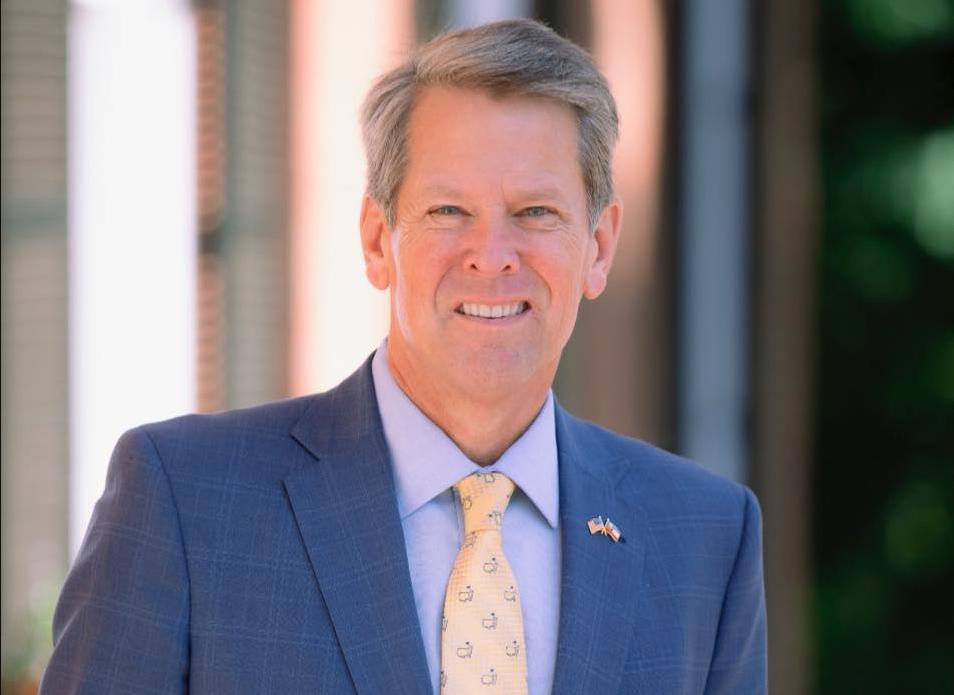
ATLANTA – Georgia’s Republican Gov. Brian Kemp on Thursday signed a ban on guideline-directed gender-affirming healthcare for transgender and nonbinary youth that was passed earlier this week by the GOP controlled state legislature.
The law threatens to revoke the medical licenses of physicians who administer treatments for gender dysphoria in minor patients that are overwhelmingly considered safe, effective, and medically necessary by every scientific and medical society with relevant clinical expertise.
A previous version of S.B. 140 applied exclusively to surgical interventions, but the version signed into law Thursday also prohibits hormone replacement therapies, although treatment with puberty blockers is still allowed.
The move by GOP legislators to expand the healthcare interventions covered by the legislation follows pressure from conservatives like far-right U.S. Rep. Marjorie Taylor Greene, who represents Georgia’s 14th Congressional District in the House and urged the state’s lawmakers last week to make the bill more restrictive.
At the time, Greene also objected to the draft bill’s “limited exceptions” carved out for cases where patients are treated for conditions other than gender dysphoria, including those diagnosed with “a medically verifiable disorder of sex development,” provided the physician can attest they are medically necessary.
These provisions were kept intact in the bill’s final iteration, which contains additional exceptions for the treatment of partial androgen insensitivity syndrome and in circumstances where the minor patient was being treated with hormone replacement therapies prior to July 1 2023.
A chorus of objections to and condemnations of the legislation have come from LGBTQ groups, along with legal and civil rights advocacy organizations and medical societies, clinicians, and scientists, including the Georgia Psychological Association.
The Human Rights Campaign, America’s largest LGBTQ advocacy group, issued a statement shortly after Kemp signed the bill Thursday, declaring that Georgia had become “the largest state to legislatively enact such a discriminatory ban.”
“Governor Kemp should be ashamed of himself — taking life-saving care away from vulnerable youth is a disgusting and indefensible act,” Human Rights Campaign State Legislative Director and Senior Counsel Cathryn Oakley said in the statement. “This law harms transgender youth and terrorizes their families, but helps no one.”
Despite the wave of legislation across the country barring access to or criminalizing gender affirming care, in most cases for minor patients, the group noted in Thursday’s release that “polling by Patinkin Research Strategies released this month shows that only 26 percent of likely November 2024 voters in Georgia supported the legislation, while 66 percent opposed it” including 63 percent of independent and 59 percent of likely Republican voters.
According to the findings of a Human Rights Campaign study that were announced Wednesday, “more than half (50.4%) of transgender youth (ages 13-17) have lost or are at risk of losing access to age appropriate, medically necessary gender-affirming care in their state” – care, the group stressed, that “can be lifesaving.”
Following the Georgia legislature’s passage of the S.B. 140 earlier this week, the ACLU warned it would “[interfere] with the rights of Georgia parents to get life-saving medical treatment for their children” and prevent “physicians from properly caring for their patients.”
The Southern Poverty Law Center released a statement by Beth Littrell, the organization’s senior supervising attorney for its LGBTQ and Special Litigation Practice Group, calling the bill a “cynical partisan attack on transgender youth, medical autonomy, and parental rights” and urging Kemp to “leave personal healthcare decisions in the capable hands of parents, children, and their doctors.”
-

 a&e features5 days ago
a&e features5 days agoMusical Mondays, a mainstay in WeHo nightlife, celebrates 16 years
-

 National3 days ago
National3 days agoDiscredited former cop played ‘key role’ in deportation of gay make-up artist
-

 Arts & Entertainment2 days ago
Arts & Entertainment2 days agoA Night of legacy, love, and liberation: Inside the 2025 April Fool’s Ball
-

 Arts & Entertainment4 days ago
Arts & Entertainment4 days ago‘Bring it to Brunch’ returns to West Hollywood
-

 Myanmar4 days ago
Myanmar4 days agoLGBTQ+ advocacy group joins Myanmar earthquake relief effort
-

 a&e features4 days ago
a&e features4 days agoPeppermint thrives in the spotlight
-

 California3 days ago
California3 days agoSouth Park provides green space to a predominantly Latino community
-

 Arts & Entertainment2 days ago
Arts & Entertainment2 days agoSouth Coast Repertory Theatre hosting world premiere production
-

 Movies2 days ago
Movies2 days agoHeartfelt ‘Wedding Banquet’ remake a romcom worth seeing
-

 Brazil1 day ago
Brazil1 day agoUS lists transgender Brazilian congresswoman’s gender as ‘male’ on visa

